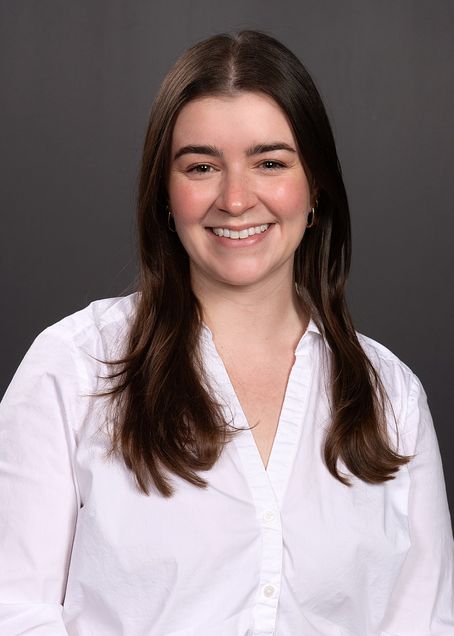2024 Outstanding Student Achievement Award: PhD Research Category
 Anna Smith ’24
Anna Smith ’24
Anna Smith is a PhD candidate in the Graduate Program in Molecular and Translational Medicine (MTM). She has been at Boston University for almost five years, having matriculated into the PhD Program in Biomedical Sciences in Fall 2019.
Anna is completing her dissertation research in the lab of Associate Professor of Medicine Valerie Gouon-Evans, PhD, PharmD. Dr. Gouon-Evans directs the Boston University Liver Biologists (BULB) Program and is the associate director of the MTM program. Anna’s research focuses on finding alternatives to liver transplantation that transplant healthy liver cells instead of an entire organ. She defended her dissertation, “Human Primary and iPSC-Derived Hepatocyte Cell Therapies to Treat Liver Disease,” in March 2024 and will graduate in May 2024.
Anna’s dissertation research won her this year’s Outstanding Student Achievement Award in the PhD Research Category. Read more about her work below!
Can you please describe the research project that led to your recognition with this award?
Currently, the main treatment for end stage liver disease is a liver transplantation; however, there is a donor organ shortage. My research project is focused on finding alternatives to liver transplantation. What we propose is to treat liver diseases by transplanting healthy liver cells instead of an entire organ.
I have been exploring liver cell transplantation in mouse models that mimic actual human liver diseases. We discovered in the lab that liver cell transplantation alone is not sufficient to treat liver disease. Next, we started administering supportive factors to help transplanted cells. Excitingly, we found that this significantly improved liver cell engraftment and actually helped treat liver disease in mice. To deliver these supportive factors to transplanted cells, we took advantage of the nucleoside modified mRNA in lipid nanoparticles (mRNA-LNP) platform.
The mRNA-LNP platform is the same technology that is used for COVID-19 vaccines, which means that we are developing a therapeutic that has strong potential to be used in humans too. We are also currently publishing this work so that it is available to the greater scientific community.
What sparked your interest with conducting research, and how did you choose this area of focus for your project?
My undergraduate mentor in college sparked my interest in research. She was a strong female role model who I really looked up to, and she helped me find the right career path based on my interests in science, helping others and mentorship. I chose to focus on a liver regeneration project because I was inspired by the Alpha-1 Foundation community. The Alpha-1 Foundation is a community of researchers, doctors, patients and their families who are all working to find a cure for Alpha-1 liver disease. This inspired me to investigate how we could use our tools in the lab to cure liver diseases such as Alpha-1.
How do you believe your research is significant to your field and/or addresses a particular issue or gap in knowledge?
My research has the potential to overcome critical barriers to the clinical translation of liver cell therapies. Currently, liver cell therapies are not widely used to treat human patients. With discoveries that I made in the lab, along with the help of all of my colleagues, liver cell therapies are a more viable alternative to organ transplantation than ever before.
Can you discuss any challenges you’ve faced during the research project and how you overcame them?
Doing scientific research always comes with significant challenges, both in and out of the lab. The most significant hurdle that we had to overcome was trying to figure out the key to get liver cells to engraft in mice. Once we figured out that the liver cells needed important supportive growth factors, we had to tackle the technical hurdle of how to deliver these factors in a living animal. We overcame these challenges and obstacles by being resilient and asking for help. We ultimately achieved success because of our strong collaborations with top scientists at other universities and companies across the world.
Looking ahead, do you have any plans to further explore the topic of your research?
Yes! I am looking forward to further exploring liver related therapeutics by working at a biotech company after graduation.